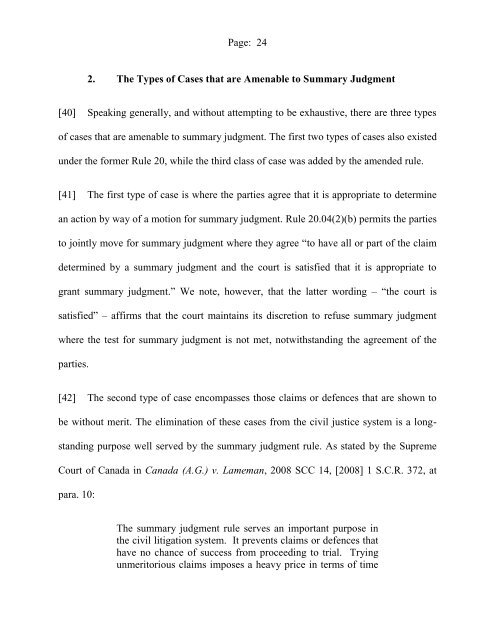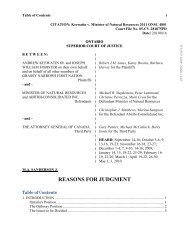COURT OF APPEAL FOR ONTARIO
COURT OF APPEAL FOR ONTARIO
COURT OF APPEAL FOR ONTARIO
Create successful ePaper yourself
Turn your PDF publications into a flip-book with our unique Google optimized e-Paper software.
Page: 24<br />
2. The Types of Cases that are Amenable to Summary Judgment<br />
[40] Speaking generally, and without attempting to be exhaustive, there are three types<br />
of cases that are amenable to summary judgment. The first two types of cases also existed<br />
under the former Rule 20, while the third class of case was added by the amended rule.<br />
[41] The first type of case is where the parties agree that it is appropriate to determine<br />
an action by way of a motion for summary judgment. Rule 20.04(2)(b) permits the parties<br />
to jointly move for summary judgment where they agree “to have all or part of the claim<br />
determined by a summary judgment and the court is satisfied that it is appropriate to<br />
grant summary judgment.” We note, however, that the latter wording – “the court is<br />
satisfied” – affirms that the court maintains its discretion to refuse summary judgment<br />
where the test for summary judgment is not met, notwithstanding the agreement of the<br />
parties.<br />
[42] The second type of case encompasses those claims or defences that are shown to<br />
be without merit. The elimination of these cases from the civil justice system is a longstanding<br />
purpose well served by the summary judgment rule. As stated by the Supreme<br />
Court of Canada in Canada (A.G.) v. Lameman, 2008 SCC 14, [2008] 1 S.C.R. 372, at<br />
para. 10:<br />
The summary judgment rule serves an important purpose in<br />
the civil litigation system. It prevents claims or defences that<br />
have no chance of success from proceeding to trial. Trying<br />
unmeritorious claims imposes a heavy price in terms of time
















